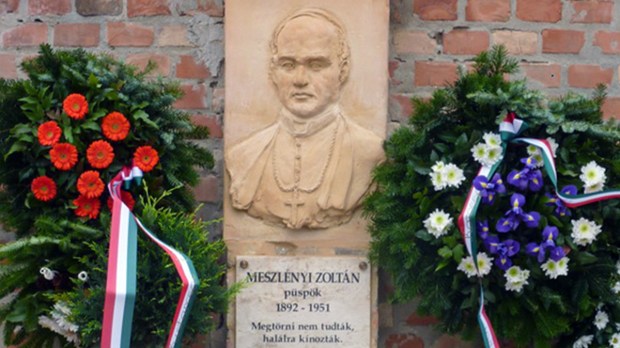Blessed Zoltán Lajos Meszlényi was a Hungarian bishop who took on the dangerous role of vicar to the archbishop of Esztergom in 1950, defying the Communist regime and its choice of candidate for the job, ultimately putting his life in peril, according to Catholic Saints Guy.
However, he took the job willingly, declaring in his inaugural speech: “Christ – because He is the faithful shepherd of the Faith and our Church – out of loyalty, we will not deny Him ever! So help me God.”
The newly-appointed bishop did not stay in his role for long. In fact, just 12 days after his inauguration, he was arrested by the Communists and sent to Kistarcsa internment camp. There the 58-year-old suffered torture, was deprived of food and heating, and was forced into harsh labor.
Since he refused to renounce his faith, the vicious torture continued. The Communists made him endure freezing weather conditions in the winter, forcing him to sleep with his windows open.
However, as his great-niece, Nora Meszlényi, shared with us: “The last person who saw him alive in the prison said that he gave him his winter coat without a second thought when he saw him shivering as it was super cold in winter.” A selfless act typical of the generous martyr he was known to be.
Inevitably, the Hungarian succumbed to the harsh treatment he received and died sometime between 1953 and 1954. The Communist government had held him without trial, and kept his fate hidden from his people.
Like many martyrs, Meszlényi put his faith before his own life. But, thanks to his great-niece, we can glean a little more about the man who’s now on the road to canonization.
Bishop Meszlényi was very humble. He was known to turn up to the family home in his “simple black priest clothes” where he was reported as being “very low key and friendly.” So it came as a shock when Nora’s father once accompanied him to meet the local mayor and “on the short walk he produced all the bishop regalia from his pockets and arrived all glam.”
Having experienced his uncle in the family home, it was equally strange for Nora’s father to witness everyone rush to kiss the hand of his uncle.
Nora also shared that although Bishop Meszlényi held such an important post in the Hungarian Church, his family was never far from his mind. He always sent her grandmother foodparcels and looked after her dad and his brother, even during the war after her grandfather died.
Perhaps the most touching story that Nora shared about her great-uncle was about his precious Bible that was never far from his side. Apparently “at the prison he gave it, his only possession at that point, to another distressed prisoner because he said the other person needed it more, and he did not need it anyway because it was in his heart.”
Even though Nora was born long after her great-uncle died, Blessed Zoltán left a permanent mark on her and so many others. “I think he was a born priest, he really lived his life as priests should … dedicating every moment of his life to the Church and his people until the very last moment.”
Interestingly, with the Eucharistic Congress closing last weekend in Hungary, it’s incredible to think that just under a century ago, in 1926, Blessed Zoltán made the incredibly long trip to New York, to then climb aboard The Cardinal’s Train, that would see him and many other clergy make their way to Chicago for the first-ever Eucharistic Congress to be held in the United States.

